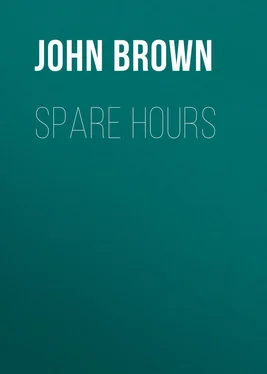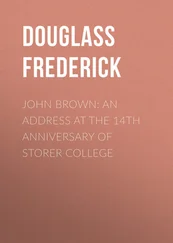John Brown - Spare Hours
Здесь есть возможность читать онлайн «John Brown - Spare Hours» — ознакомительный отрывок электронной книги совершенно бесплатно, а после прочтения отрывка купить полную версию. В некоторых случаях можно слушать аудио, скачать через торрент в формате fb2 и присутствует краткое содержание. ISBN: , Жанр: foreign_antique, foreign_prose, на английском языке. Описание произведения, (предисловие) а так же отзывы посетителей доступны на портале библиотеки ЛибКат.
- Название:Spare Hours
- Автор:
- Жанр:
- Год:неизвестен
- ISBN:http://www.gutenberg.org/ebooks/27153
- Рейтинг книги:4 / 5. Голосов: 1
-
Избранное:Добавить в избранное
- Отзывы:
-
Ваша оценка:
- 80
- 1
- 2
- 3
- 4
- 5
Spare Hours: краткое содержание, описание и аннотация
Предлагаем к чтению аннотацию, описание, краткое содержание или предисловие (зависит от того, что написал сам автор книги «Spare Hours»). Если вы не нашли необходимую информацию о книге — напишите в комментариях, мы постараемся отыскать её.
Spare Hours — читать онлайн ознакомительный отрывок
Ниже представлен текст книги, разбитый по страницам. Система сохранения места последней прочитанной страницы, позволяет с удобством читать онлайн бесплатно книгу «Spare Hours», без необходимости каждый раз заново искать на чём Вы остановились. Поставьте закладку, и сможете в любой момент перейти на страницу, на которой закончили чтение.
Интервал:
Закладка:
I believe he never did; nor after either. “Rab!” he said roughly, and pointing with his thumb to the bottom of the bed. Rab leapt up, and settled himself; his head and eye to the dead face. “Maister John, ye’ll wait for me,” said the carrier; and disappeared in the darkness, thundering down-stairs in his heavy shoes. I ran to a front window; there he was, already round the house, and out at the gate, fleeing like a shadow.
I was afraid about him, and yet not afraid; so I sat down beside Rab, and being wearied, fell asleep. I awoke from a sudden noise outside. It was November, and there had been a heavy fall of snow. Rab was in statu quo ; he heard the noise too, and plainly knew it, but never moved. I looked out; and there, at the gate, in the dim morning – for the sun was not up – was Jess and the cart, – a cloud of steam rising from the old mare. I did not see James; he was already at the door, and came up the stairs, and met me. It was less than three hours since he left, and he must have posted out – who knows how? – to Howgate, full nine miles off; yoked Jess, and driven her astonished into town. He had an armful of blankets, and was streaming with perspiration. He nodded to me, spread out on the floor two pairs of clean old blankets having at their corners, “A. G., 1794,” in large letters in red worsted. These were the initials of Alison Graeme, and James may have looked in at her from without – himself unseen but not unthought of – when he was “wat, wat, and weary,” and after having walked many a mile over the hills, may have seen her sitting, while “a’ the lave were sleepin’;” and by the firelight working her name on the blankets, for her ain James’s bed.
He motioned Rab down, and taking his wife in his arms, laid her in the blankets, and happed her carefully and firmly up, leaving the face uncovered; and then lifting her, he nodded again sharply to me, and with a resolved but utterly miserable face, strode along the passage, and down-stairs, followed by Rab. I followed with a light; but he didn’t need it. I went out, holding stupidly the candle in my hand in the calm frosty air; we were soon at the gate. I could have helped him, but I saw he was not to be meddled with, and he was strong, and did not need it. He laid her down as tenderly, as safely, as he had lifted her out ten days before – as tenderly as when he had her first in his arms when she was only “A. G.,” – sorted her, leaving that beautiful sealed face open to the heavens; and then taking Jess by the head, he moved away. He did not notice me, neither did Rab, who presided behind the cart.
I stood till they passed through the long shadow of the College, and turned up Nicolson Street. I heard the solitary cart sound through the streets, and die away and come again; and I returned, thinking of that company going up Libberton Brae, then along Roslin Muir, the morning light touching the Pentlands and making them like on-looking ghosts; then down the hill through Auchindinny woods, past “haunted Woodhouselee;” and as daybreak came sweeping up the bleak Lammermuirs, and fell on his own door, the company would stop, and James would take the key, and lift Ailie up again, laying her on her own bed, and, having put Jess up, would return with Rab and shut the door.
James buried his wife, with his neighbors mourning, Rab inspecting the solemnity from a distance. It was snow, and that black ragged hole would look strange in the midst of the swelling spotless cushion of white. James looked after everything; then rather suddenly fell ill, and took to bed; was insensible when the doctor came, and soon died. A sort of low fever was prevailing in the village, and his want of sleep, his exhaustion, and his misery, made him apt to take it. The grave was not difficult to reopen. A fresh fall of snow had again made all things white and smooth; Rab once more looked on, and slunk home to the stable.
And what of Rab? I asked for him next week at the new carrier who got the goodwill of James’s business, and was now master of Jess and her cart. “How’s Rab?” He put me off, and said rather rudely, “What’s your business wi’ the dowg?” I was not to be so put off. “Where’s Rab?” He, getting confused and red, and intermeddling with his hair, said, “’Deed, sir, Rab’s deid.” “Dead! what did he die of?” “Weel, sir,” said he, getting redder, “he didna exactly dee; he was killed. I had to brain him wi’ a rack-pin; there was nae doin’ wi’ him. He lay in the treviss wi’ the mear, and wadna come oot. I tempit him wi’ kail and meat, but he wad tak naething, and keepit me frae feedin’ the beast, and he was aye gur gurrin’, and grup gruppin’ me by the legs. I was laith to make awa wi’ the auld dowg, his like wasna atween this and Thornhill, – but, ’deed, sir, I could do naething else.” I believed him. Fit end for Rab, quick and complete. His teeth and his friends gone, why should he keep the peace, and be civil?
“With BRAINS, Sir.”
“Multi multa sciunt, pauci multum.”
“It is one thing to wish to have truth on our side , and another thing to wish to be on the side of truth .” — Whately.
“Ἀταλαίπωρος τοῖς πολλοῖς ἡ ζητησις τῆς ἀληφείας, καὶ ἐπὶ τὰ ἔτοιμα μᾶλλον τρέπονται.” – Thucydides.
“The most perfect philosophy of the natural kind, only staves off our IGNORANCE a little longer; as, perhaps, the most perfect philosophy of the moral or metaphysical kind, serves only to discover larger portions of it.” — David Hume.
“WITH BRAINS, SIR.”
“Pray, Mr. Opie, may I ask what you mix your colors with?” said a brisk dilettante student to the great painter. “With Brains , sir,” was the gruff reply – and the right one. It did not give much of what we call information; it did not expound the principles and rules of the art; but, if the inquirer had the commodity referred to, it would awaken him; it would set him a-going, a-thinking, and a-painting to good purpose. If he had not the wherewithal, as was likely enough, the less he had to do with colors and their mixture the better. Many other artists, when asked such a question, would have either set about detailing the mechanical composition of such and such colors, in such and such proportions, rubbed up so and so; or perhaps they would (and so much the better, but not the best) have shown him how they laid them on; but even this would leave him at the critical point. Opie preferred going to the quick and the heart of the matter: “With Brains , sir.”
Sir Joshua Reynolds was taken by a friend to see a picture. He was anxious to admire it, and he looked it over with a keen and careful but favorable eye. “Capital composition; correct drawing; the color, tone, chiaroscuro excellent; but – but – it wants, hang it, it wants — That! ” snapping his fingers; and, wanting “that,” though it had everything else, it was worth nothing.
Again, Etty was appointed teacher of the students of the Royal Academy, having been preceded by a clever, talkative, scientific expounder of æsthetics, who delighted to tell the young men how everything was done, how to copy this, and how to express that. A student came up to the new master, “How should I do this, sir?” “Suppose you try.” Another, “What does this mean, Mr. Etty?” “Suppose you look.” “But I have looked.” “Suppose you look again.” And they did try, and they did look, and looked again; and they saw and achieved what they never could have done, had the how or the what (supposing this possible, which it is not in its full and highest meaning) been told them, or done for them; in the one case, sight and action were immediate, exact, intense, and secure; in the other mediate, feeble, and lost as soon as gained. But what are “ Brains ”? what did Opie mean? and what is Sir Joshua’s “ That ”? What is included in it? and what is the use, or the need of trying and trying, of missing often before you hit, when you can be told at once and be done with it; or of looking when you may be shown? Everything in medicine and in painting – practical arts – as means to ends, let their scientific enlargement be ever so rapid and immense, depends upon the right answers to these questions.
Читать дальшеИнтервал:
Закладка:
Похожие книги на «Spare Hours»
Представляем Вашему вниманию похожие книги на «Spare Hours» списком для выбора. Мы отобрали схожую по названию и смыслу литературу в надежде предоставить читателям больше вариантов отыскать новые, интересные, ещё непрочитанные произведения.
Обсуждение, отзывы о книге «Spare Hours» и просто собственные мнения читателей. Оставьте ваши комментарии, напишите, что Вы думаете о произведении, его смысле или главных героях. Укажите что конкретно понравилось, а что нет, и почему Вы так считаете.












